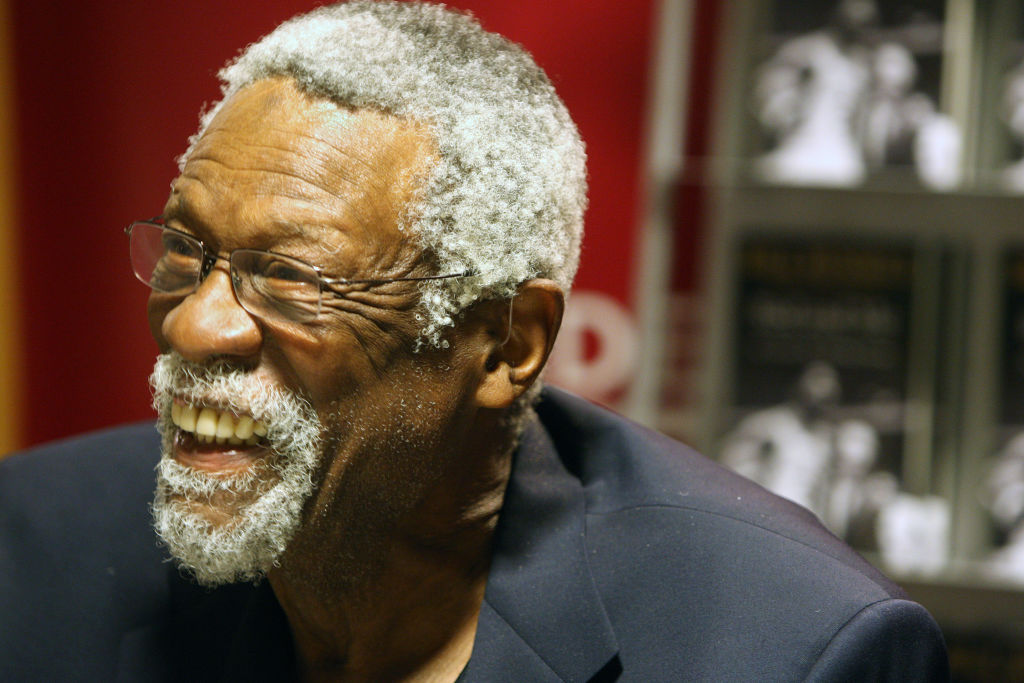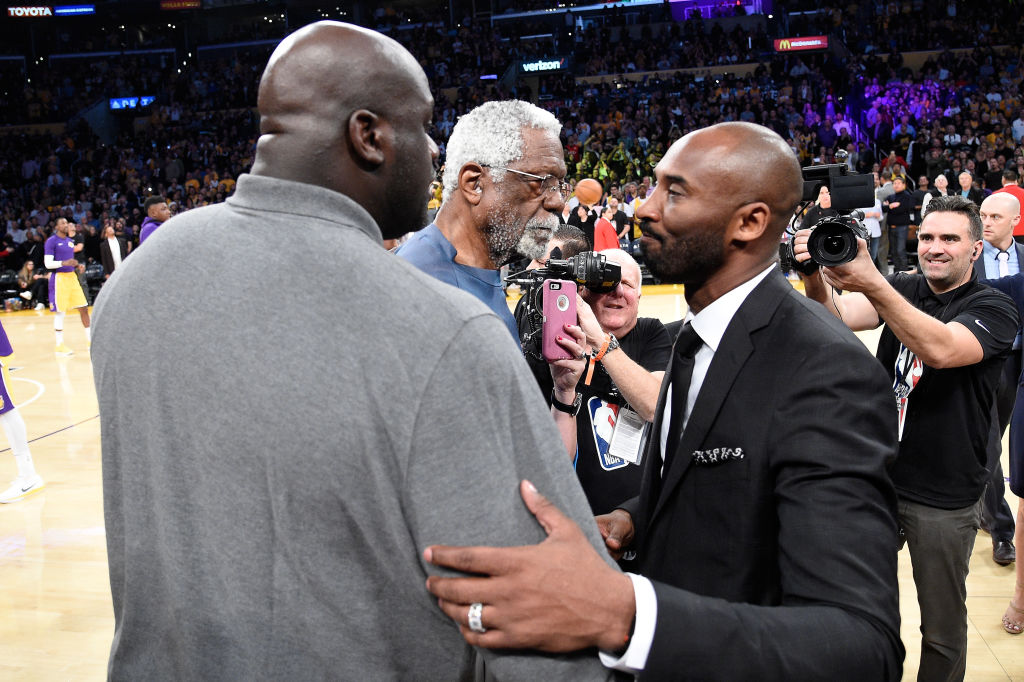
Source: Boston Globe / Getty
The sports world lost one of its greatest winners with yesterday’s passing of legendary Boston Celtics center Bill Russell. Also nicknamed “The Secretary of Defense” and “Mr. 11 Rings,” Russell was the consummate team player and won on every level in basketball, starting from college through his NBA career, including the Olympics. But the story of the West Monroe, LA native will never be complete without speaking about the capstone of his legacy as well: Russell’s lifelong fight to achieve social equality in America.
Eleven years ago, at the 2011 Presidential Medal of Freedom ceremony, President Barack Obama said the following of the late Celtics great: “Whenever someone looks up at all 6-9 of Bill Russell and asks [him], ‘Are you a basketball player?’ he says, ‘No… that’s what I do, that’s not what I am. I’m not a basketball player — I am a man who plays basketball.’ Bill Russell, the man, is someone who stood up for the rights and dignity of all men.”
Russell was very well known for his sarcastic wit and steely persona. Though he is one of Beantown’s greatest sports icons, the city was not always kind towards Russell. And it would be decades until his hardline stance towards Boston thawed some. However, there are other narratives about the giant that reveal a quiet warmth and desire for reconciliation in his personal life, too.
Here are four stories about the late great icon born William Felton Russell.
I. Bill Russell leads a 1961 boycott to protest racial discrimination
In October 1961, the Celtics traveled to Lexington, Ky., for a pre-season exhibition game. Sam Jones and Tom Sanders, two of Russell’s teammates [who were both Black], were denied service at the same café of the hotel where they were staying.
Understandably upset, the men were making their way back to their rooms when they encountered fellow Celtics Russell and K.C. Jones and told them what happened. So the four players went to Coach Red Auerbach and relayed the incident to him. And after Auerbach’s intervention, the hotel allegedly went back on its stance and allowed the men to eat at the café.
Instead, the Celtics opted to hitch a flight back to Boston, effectively canceling their game. By many accounts, it was the first recorded protest of its kind by a sports team.
As detailed in Mark C. Bodanza’s biography of Sam Jones, Ten Times a Champion, Russell made the following statement to reporters the next day in Boston: “We’ve got to show our disapproval of this kind of treatment, or else the status quo will prevail. We have the same rights and privileges as anyone else and deserve to be treated accordingly. I hope we never have to go through this abuse again. But if it happens, we won’t hesitate to take the same action again.”
II. After 24 Years of Silence Towards Each Other, Bill Russell and Friend-Turned-Foe Wilt Chamberlain Mend Fences And Revive Their Friendship Once Again
In any good tale, the protagonist has a foil who should be a shoo-in to win every encounter they have. And Russell’s foil was one of the most dominant persons ever in the history of sports: Wilt Chamberlain. At 7’1″ and a reported 275 pounds, Chamberlain was a true freak of nature, and his many feats of athleticism defied any logic.
Yet, Russell’s Celtics regularly outperformed Chamberlain and the Los Angeles Lakers, to the tune of 11 rings to two. And the two were quite chummy off the court, with Russell regularly going to Chamberlain’s home to spend the Thanksgiving holiday season.
However, Chamberlain suffered an injury in their final battle against each other, which was Game 7 of the 1969 NBA Finals. And in the inaugural episode of her podcast Icons Club, sportswriter Jackie MacMullan shared how Russell felt he was robbed of the opportunity to cement his dominance versus Chamberlain: “In a speech at the University of Wisconsin later that year, he claimed that Wilt ‘copped out’ of the game and that ‘any injury short of a broken leg or broken back isn’t good enough.’’
“A wounded Wilt stopped talking to Russell for decades,” MacMullan continued. “Russell wrote in his memoir, Second Wind, ‘Wilt’s leaving was like a misspelled word at the end of a cherished book. My anger at him that night caused great friction between us.'” And that friction would last for nearly two-and-a-half decades.
It wouldn’t be until 1993 when the ice between Russell and Chamberlain started to thaw, thanks to the emergence of a young NBA superstar named Shaquille O’Neal.
One year prior, Reebok signed the 7’1″, 294-pound phenom to a $15 million multi-year deal, and the sneaker company was filming a commercial that highlighted O’Neal’s penchant for backboard-shattering dunks. Other legendary NBA big men appear in the commercial — including Russell, Chamberlain, Bill Walton, and Kareem Abdul-Jabbar — and they warn the Orlando Magic center that his monstrous jams aren’t the way to win championships, though.
The entire set was unsure how Russell and Chamberlain would share the space. But Walton revealed that it was Chamberlain, whose “magnanimous personality” put everyone at ease as he extended the first olive branch towards his friend. And in a moment as intimate as a secret handshake, they even referred to each other by their middle names.
The normally reserved Russell seemed relieved that his relationship with Chamberlain was restored, and he confided in his friend, ‘You are the only person who understands how I feel.’”
III. Bill Russell Helped Broker the End of the Kobe-Shaq Feud
Russell and Chamberlain were known for their intense battles and different personalities, but their tension primarily centered around basketball. However, the Kobe-Shaq feud was different for a variety of reasons, including the fact that the two younger men were teammates of a championship dynasty when they had their falling out, and the barbs exchanged between Bryant and O’Neal were personal.
O’Neal and Bryant each had their own separate relationships with Russell, but both also always had the utmost reverence for the elder statesman, too. So the retired 11x NBA champ took a page from his own experience with Chamberlain and told O’Neal that he could be the bigger man here.
“I had orders from the great Bill Russell,” O’Neal shared with ESPN in 2006. “Me and him were talking in Seattle the other day, and he was telling me how rivalries should be. I asked him if he ever disliked anybody he played against, and he told me, ‘No, never,’ and he told me that I should shake Kobe Bryant’s hand and let bygones be bygones and bury the hatchet.”
And so, 16 years ago on MLK Day, O’Neal did exactly that — he reportedly walked to his former Lakers teammate, congratulated him on the birth of his first child, and also wished Bryant the best on the birth of his upcoming second child, Gianna.
“It made me feel good,” Bryant told the outlet. “We’ve been through so many wars together. Now, just be able to move on, try to do the best for this team, wish him the best in South Beach. I think it’s good for the city of Los Angeles, good for the NBA, good for the youth, being Martin Luther King Day.”

Source: Kevork Djansezian / Getty
IV. Bill Russell Commends The NBA For Boycotts in the Wake of George Floyd’s and Jacob Blake’s Shooting at the Hands of Police: “Keep Getting In Good Trouble”
Two years ago, Russell wrote a piece for a special issue of SLAM Magazine, with Carmelo Anthony as its guest editor. In it, the lifelong activist and civilly disobedient Russell shared his many chilly confrontations with law enforcement. He spoke on the racist taunts he endured from Bostonians even though he brought the city 11 NBA championships.
On August 26, 2020, the Milwaukee Bucks boycotted Game 5 of the 2020 NBA playoffs in the wake of Jacob Blake’s shooting by Wisconsin police. This came only months after the killings of George Floyd, Breonna Taylor, and Ahmaud Arbery in the same year. Soon after, other NBA games were canceled that day, and so it was only fitting that Russell would commend the league and its players for “getting in good trouble.”
Below is the coda to Mr. Russell’s piece, published the same day as those NBA protests two years ago:
“Racism cannot just be shaken out of the fabric of society because, like dust from a rug, it dissipates into the air for a bit and then settles right back where it was, growing thicker with time.
Police reform is a start, but it is not enough. We need to dismantle broken systems and start over. We need to make our voices heard, through multiple organizations, using many different tactics. We need to demand that America gets a new rug.
In many ways, I owe my happiness to the love my parents gave me. Their love gave me the confidence to simply be me: a proud Black man, fair, and I believe, dignified.
Of course, as too many Black and Brown mothers will tell you, all the love in the world can’t keep a Black child from being murdered.
More dust in the rug.
Our children deserve better.
All of them.”
Thank you, Mr. Russell for your legacy and your example. You were a true winner, on and off the court. Rest in power, King.
















